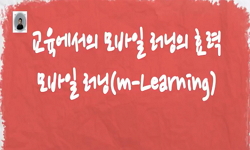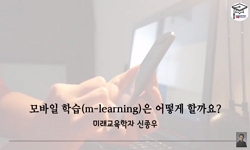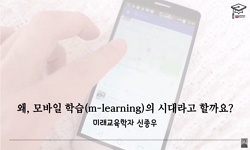Mobile technologies are receiving an increasing attention within diverse educational contexts. However, the scope of research on the affordances various mobile technologies provide to learning outcomes is still limited. The aim of this study was to in...
http://chineseinput.net/에서 pinyin(병음)방식으로 중국어를 변환할 수 있습니다.
변환된 중국어를 복사하여 사용하시면 됩니다.
- 中文 을 입력하시려면 zhongwen을 입력하시고 space를누르시면됩니다.
- 北京 을 입력하시려면 beijing을 입력하시고 space를 누르시면 됩니다.


The Impact of Mobile Technology on Vocabulary Learning of L2 Learners: The Case of WhatsApp Application
한글로보기https://www.riss.kr/link?id=A107356062
-
저자
Shirin Tahounehchi (Molana University, Iran)

- 발행기관
- 학술지명
- 권호사항
-
발행연도
2021
-
작성언어
English
- 주제어
-
등재정보
KCI등재,SCOPUS,ESCI
-
자료형태
학술저널
-
수록면
223-234(12쪽)
-
KCI 피인용횟수
0
- 제공처
-
0
상세조회 -
0
다운로드
부가정보
다국어 초록 (Multilingual Abstract)
Mobile technologies are receiving an increasing attention within diverse educational contexts. However, the scope of research on the affordances various mobile technologies provide to learning outcomes is still limited. The aim of this study was to investigate the effect of using WhatsApp application on vocabulary learning of Iranian EFL learners. Twenty-six female EFL learners at pre-intermediate level of proficiency were selected through convenience sampling to participate in the study. A vocabulary test was utilized for ensuring the homogeneity of the learners and then the participants were divided into two experimental (N = 13) and control (N = 13) groups, followed by assessing their vocabulary knowledge. Then, the 14-session treatment began, which included teaching new words using WhatsApp in the experimental group and traditional face-to-face method in the control group. At the end of the course, a vocabulary post–test was administered to both groups. Additionally, an attitude questionnaire was administrated to both groups for examining their attitude towards using WhatsApp and the traditional vocabulary learning method. The results indicated that the experimental group outperformed the control group. In addition, it was revealed that the learners who used WhatsApp for enhancing their vocabulary skill had a more positive attitude toward foreign language vocabulary learning as compared to the other group. The implications of the study for mobile-assisted vocabulary learning are discussed.
참고문헌 (Reference)
1 Manan, N. A., "Whatsapp mobile tool in second language learning" 3 (3): 87-92, 2017
2 Alzubi, M., "Using mobile-based email for English as a foreign language learners" 12 (12): 1-7, 2013
3 Suwantara, O., "Using mobile-assisted exercises to support students’vocabulary skill development" 14 (14): 163-171, 2015
4 Lan, Y., "Using RSS to support mobile learning based on media richness theory" 55 (55): 723-732, 2010
5 Jadhav, D., "Usability evaluation of messenger applications for Android phones using cognitive walkthrough" 9-18, 2013
6 Arancon, R., "The use of current mobile learning applications in EFL" 26 : 1189-1196, 2013
7 Jones, C., "The net generation and digital natives: implications for higher education"
8 Alghamdy, R. Z., "The impact of mobile language learning(WhatsApp)on EFL context : Outcomes and perceptions" 9 (9): 128-135, 2019
9 Heidari Tabrizi, H., "The impact of employing telegram app on Iranian EFL beginners’ vocabulary teaching and learning" 2 (2): 30-35, 2018
10 Bensalem, E., "The impact of Whatsapp on EFL students’ vocabulary learning" 9 (9): 1-16, 2018
1 Manan, N. A., "Whatsapp mobile tool in second language learning" 3 (3): 87-92, 2017
2 Alzubi, M., "Using mobile-based email for English as a foreign language learners" 12 (12): 1-7, 2013
3 Suwantara, O., "Using mobile-assisted exercises to support students’vocabulary skill development" 14 (14): 163-171, 2015
4 Lan, Y., "Using RSS to support mobile learning based on media richness theory" 55 (55): 723-732, 2010
5 Jadhav, D., "Usability evaluation of messenger applications for Android phones using cognitive walkthrough" 9-18, 2013
6 Arancon, R., "The use of current mobile learning applications in EFL" 26 : 1189-1196, 2013
7 Jones, C., "The net generation and digital natives: implications for higher education"
8 Alghamdy, R. Z., "The impact of mobile language learning(WhatsApp)on EFL context : Outcomes and perceptions" 9 (9): 128-135, 2019
9 Heidari Tabrizi, H., "The impact of employing telegram app on Iranian EFL beginners’ vocabulary teaching and learning" 2 (2): 30-35, 2018
10 Bensalem, E., "The impact of Whatsapp on EFL students’ vocabulary learning" 9 (9): 1-16, 2018
11 Motallebzadeh, K., "The effect of short message service on the retention of collocations among Iranian lower intermediate EFL learners" 1 (1): 1514-1520, 2011
12 Yang, S. C., "Technology-enhanced language learning : A case study" 23 : 860-879, 2007
13 Astika, G., "Teaching English vocabulary: What international language educators tell us"
14 O’Bannon, B. W., "Teacher perceptions of using mobile phones in the classroom:Age matters!" 74 : 15-25, 2014
15 Saran, M., "Supporting foreign language vocabulary learning through multimedia messages via mobile phones" 38 : 252-266, 2010
16 Afshari, M., "Students’ attitude towards computer-assisted language learning" 103 : 852-859, 2013
17 Taxler, J., "Mobile learning: It’s here, but what is it?"
18 Nazari, M., "L2 teachers’ mobile-related beliefs and practices: Contributions of a professional development initiative" 2020
19 Ashiyan, Z., "Impact of WhatsApp on learning and retention of collocation knowledge among Iranian EFL learners" 7 (7): 112-127, 2016
20 Hsu, L., "Examining EFL teachers’ technological pedagogical content knowledge and the adoption of mobile-assisted language learning : A partial least square approach" 29 : 1287-1297, 2016
21 Lin, L., "English learners’ incidental vocabulary acquisition in the video-based CALL program" 12 (12): 51-66, 2010
22 Chinnery, G. M., "Emerging technologies, going to the MALL : Mobile assisted language learning" 10 (10): 9-16, 2006
23 Huang, C. S., "Effects of situated mobile learning approach on learning motivation and performance of EFL students" 19 (19): 263-276, 2016
24 Lu, M., "Effectiveness of vocabulary learning via mobile phone" 24 (24): 515-525, 2008
25 Wang, Y. H., "Could a mobile assisted learning system support flipped classrooms for classical Chinese learning?" 32 (32): 391-415, 2016
26 Stowe, J. W. A., "Comparison of learning performance between students who do and students who do not use mobile technology-based activities" University of North Texas 2013
27 Basoglu, E. B., "A comparison of undergraduate students’ English vocabulary learning : Using mobile phones and flash cards" 9 (9): 1-7, 2010
동일학술지(권/호) 다른 논문
-
- 아시아테플
- Ali Derakhshan
- 2021
- KCI등재,SCOPUS,ESCI
-
- 아시아테플
- Hanna Sundari
- 2021
- KCI등재,SCOPUS,ESCI
-
- 아시아테플
- Muhammad Wasim Latif
- 2021
- KCI등재,SCOPUS,ESCI
-
- 아시아테플
- Tusino
- 2021
- KCI등재,SCOPUS,ESCI
분석정보
인용정보 인용지수 설명보기
학술지 이력
| 연월일 | 이력구분 | 이력상세 | 등재구분 |
|---|---|---|---|
| 2023 | 평가예정 | 해외DB학술지평가 신청대상 (해외등재 학술지 평가) | |
| 2020-01-01 | 평가 | 등재학술지 유지 (해외등재 학술지 평가) |  |
| 2018-03-29 | 학회명변경 | 한글명 : 아시아영어교육학회 -> 아시아테플영문명 : The Asian Association Of Teachers Of English As A Foreign Language (Asia Tefl) -> AsiaTEFL (The Asian Association of Teachers of English As a Foreign Language) |  |
| 2013-10-01 | 평가 | 등재학술지 선정 (기타) |  |
| 2010-01-01 | 평가 | SCOPUS 등재 (신규평가) |  |
학술지 인용정보
| 기준연도 | WOS-KCI 통합IF(2년) | KCIF(2년) | KCIF(3년) |
|---|---|---|---|
| 2016 | 0 | 0 | 0 |
| KCIF(4년) | KCIF(5년) | 중심성지수(3년) | 즉시성지수 |
| 0 | 0 | 0 | 0 |




 KCI
KCI eArticle
eArticle






